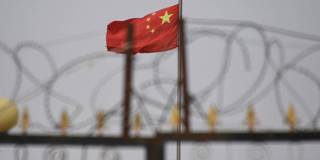For decades after US President Richard Nixon's historic trip to China, the West's engagement with the country was defined by core security and economic interests, and only then by human rights. But in just the past few years, these priorities have been inverted.
NEW YORK – Despite US President Donald Trump’s indifference toward the issue, human rights have assumed a central place in the mounting confrontation between the United States and China. Between imprisoning much of its mainly Muslim Uighur population, imposing a new security law on Hong Kong, and expanding its Big Brother-like surveillance state, China’s flagrant human-rights violations have helped to inflame US-China relations more than at any time since President Richard Nixon’s visit to Beijing in 1972. The long Sino-American honeymoon that followed that diplomatic breakthrough is now definitively over.
For over four decades, US policymakers viewed human rights in China not as a question of core interests, but rather as a matter of values to be promoted when doing so did not interfere with higher-priority security or economic concerns. As recently as 2016, when Trump campaigned against China, his objection was to “unfair” trade relations, not human rights. Upon taking office, he refrained from public – and private, as far as we know – criticism of China’s human-rights record in the apparent hope of reaching a trade deal.
But within the last year or so, Trump administration officials who view China as an existential threat to the United States have pushed the Sino-American clash of values to the center of the two countries’ strategic rivalry. As Secretary of State Mike Pompeo put it in October 2019:

NEW YORK – Despite US President Donald Trump’s indifference toward the issue, human rights have assumed a central place in the mounting confrontation between the United States and China. Between imprisoning much of its mainly Muslim Uighur population, imposing a new security law on Hong Kong, and expanding its Big Brother-like surveillance state, China’s flagrant human-rights violations have helped to inflame US-China relations more than at any time since President Richard Nixon’s visit to Beijing in 1972. The long Sino-American honeymoon that followed that diplomatic breakthrough is now definitively over.
For over four decades, US policymakers viewed human rights in China not as a question of core interests, but rather as a matter of values to be promoted when doing so did not interfere with higher-priority security or economic concerns. As recently as 2016, when Trump campaigned against China, his objection was to “unfair” trade relations, not human rights. Upon taking office, he refrained from public – and private, as far as we know – criticism of China’s human-rights record in the apparent hope of reaching a trade deal.
But within the last year or so, Trump administration officials who view China as an existential threat to the United States have pushed the Sino-American clash of values to the center of the two countries’ strategic rivalry. As Secretary of State Mike Pompeo put it in October 2019: